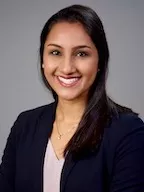Nisha Parmeshwar

| Why Was I interested in this T32? |
| RESPONSE: I was interested in this T32 for the unique opportunity to thoroughly explore translational, regulatory, and implementation science as it pertains to my research. Often as medical providers, we only think about a problem from the clinical perspective based on what we see in practice. However, as I learned from this T32, to be successful and effective leaders in healthcare, we need to understand all aspects of the system we work in to incite change. I was excited about the potential to work with and learn from mentors with diverse backgrounds who could help me approach my questions of interest from different perspectives. By having mentors who each have expertise in translational, regulatory, and health sciences from the beginning of my research time, I was much more prepared to anticipate and handle any issues with my projects and better equipped to plan for potential expansion in the future. |
| What did I work on in my T32 research project? |
During my year, I worked on two prospective trials focusing on improved outcomes for breast reconstruction surgery with my mentors Dr Laura Esserman and Dr Merisa Piper. First, I continued the ongoing microbiome trial in breast reconstruction looking at the impact of prophylactic oral antibiotics on infection rates, and the microbiome of post-mastectomy breast reconstruction patients. This trial was started the prior year by previous T32 scholar Dr. Laura Barnes, and randomized patients getting post-mastectomy implant-based reconstruction to either 7 days or 24 hours of antibiotics. In my year, we continued recruitment and expanded our sample size. We also sent the first pilot cohort of 40 patients’ samples for microbiome analysis, and now have interesting data on the relative abundance of various species, working with Dr Michael Campbell. We are comparing antibiotic cohort data over time and evaluating correlations between microbiome signals and clinical outcomes, and this novel data is the first of its kind in post-mastectomy breast reconstruction research. Secondly, I began a new prospective trial to investigate the role of topical tranexamic acid (TXA) in decreasing bleeding, hematoma, seroma rates, and ecchymosis in bilateral mastectomy patients. Tranexamic acid is an anti-fibrinolytic agent used off-label in other surgical fields to decrease bleeding. In this study, we use each patient as their own internal control, exposing one mastectomy flap to topical TXA solution, and the other side to saline in order to compare outcomes for use of TXA. We are continuing to recruit patients for this trial and excited to see the impact in our results! |
| Important lessons I learned from the T32 program and the I2I Leadership course |
RESPONSE: My experiences with these trials and the T32 have shown me the importance of having a strong team with a variety of backgrounds and skills. There are so many moving parts to starting a clinical research trial and having colleagues with expertise and experience in various aspects with different perspectives is crucial to understanding and overcoming any barriers to the project’s implementation. Additionally, I learned how challenging it can be to enroll patients into randomized studies, as well as studies with off-label agents. It is truly fascinating that many surgeons of varying specialties including at our institution use TXA every day in their cases to optimize outcomes without any questions, but the oversight when in a prospective trial is much more complex. My T32 mentors with experience in regulatory science were also crucial to understanding the process of FDA approval and why agents may remain off-label despite widespread use. I also learned a lot about leadership and effective skills I can implement to be successful in my own career. The Idea To Impact (I21) course was particularly valuable because we were able to interact with guest speakers who have all been extremely successful in various areas of healthcare, but see the key themes that resonated across each of their careers and outlooks. Many speakers talked about how these skills---building a network, putting yourself out there, continuing to ask even if you’ve been turned down--- are not natural skills but learned behaviors for everyone, and that was extremely important to hear as a young trainee. As a result, I began to appreciate the importance of building a network of people I trust and even over the course of the year I saw that network expand in subtle ways where I was fortuitously brought contacts that have already been extremely helpful to my endeavors.
|
